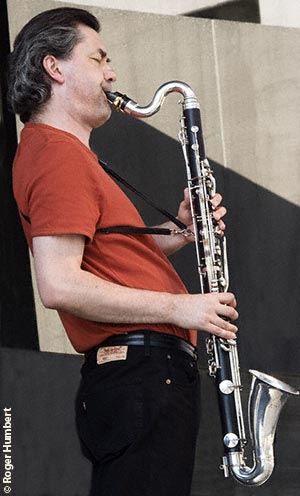| The Trio gave us a concert of interesting, unusual and often very beautiful music, (“Turkish Woman in the Bath” seemed particularly suited to the steamy afternoon heat) but the performance was quite different from what was planned — but there you go, it’s jazz, you have to improvise. Listening to the results, as on this occasion, can be rewarding. I did enjoy the second set more than the first, the following interview may explain why.
Joyce Corbett What would you like to say about the music you just played?
Denis Colin It’s something very difficult for an artist, to explain what he is doing with words. In some ways I don’t know what I’m doing. I mean I don’t really know the gap (if that is the right word) in between what I feel, why I am making the music, why (how) I am living the music, speaking the music and what people receive of that — what they think of it.
Today we did two sets. We had a problem with the organization of the concert because we were supposed to have a concert with a singer, you know? We’ve done so many concerts as a trio all over the world it’s not a problem to do the concert as a trio but inside I had the feeling that there are people waiting to hear the trio with a singer and the singer is not here, so there is the outside against the inner feeling that there is something wrong.
At this point an air ambulance helicopter flies low over the square, halting our conversation.
DC Well, I’m glad it’s after the concert.
JC Yes, it’s a good thing that didn’t happen earlier. But there was the bell! (The very loud bell of the Old City Hall tolled 6 during the second set)
DC Yes! (he laughs excitedly)
JC It fit!
DC The bell was nice! I mean I heard it and I said yes, o.k. I knew it was 6 and the pitch was perfect, then when it began the 6, wow! That was funny.
JC Yes, it was funny.
DC Of course we played our music as far as we really could. In the second set on a personal level I felt freer. I said o.k. so we are a trio. I don’t know why I am speaking about this, if it is interesting to people.
JC It is interesting.
DC: It’s just the kind of thing we have to fight inside. Thinking you will be doing one thing and you’re doing something else, it’s disappointing. But then, the fact is we are here to play music so we played music. It was just a personal thing, we are a trio who has played together for 16 years, so it’s o.k.
JC How did you come to where you are now musically? And what are you doing in your music?
DC I came to music 35 years ago when I discovered free jazz. I really loved music, I was listening to a lot of things, especially the music of Jimi Hendrix but when I discovered free jazz it was no longer just loving the music but a desire to be a musician.
JC That was the transition.
DC Yes, that was the transition. Then, I worked in Paris with a lot of American musicians from New York like Alan Silva and others, guys living in Paris since the end of the 60s, some of whom still live there. I began to work mainly with Alan Silva.
One of the main things that came out of working with the Black American free jazz artists was their idea that free jazz was their music — forever. There was no way for me to become a free jazz player because that came from their history. They said it is good for you to learn this but you can’t make your life with this. And it’s very true if you want to build something spiritual in art.
The same idea was expressed by the painter Wassily Kandinsky at the beginning of the 20th century. Art is based on the human being’s place in time. The artist makes a form, other artists later can re-make the same form. You can always make a sculpture like the Greeks but it doesn’t have the same meaning, it does not have the same value culturally. It becomes something different. The main thing I learned, what they told me, was you have to find your own thing. This trio comes from that.
As a trio we have done a lot of work. We use lots of musical forms. For example, I was working on Lydian scales at the same time we were working on Iranian and Turkish rhythms so we created with that, working on that kind of idea. We were interested in how other music works, the architecture of other music, it’s inner mechanisms. Not the style that people hear first and say oh yes, that is jazz or whatever, but the structure. From the elements, we build our own form. We’re creating from different kinds of rules that make sense to us and we build our own sound instead of imitating, we’re creating something new.
While we were talking Gwen Matthews had arrived and at this point, we concluded the interview and Denis Colin went off to join her.
I strongly urge you to get a taste of their music at www.deniscolin.com
|



